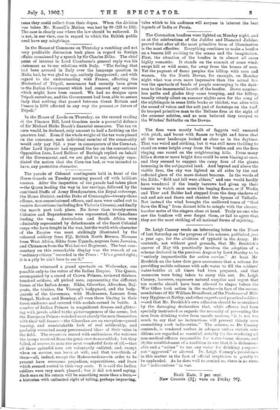London witnessed a grand spectacle on Wednesday, one possible only
to the rulers of the Indian Empire. The Queen, accompanied by a crowd of Crown Princes, reviewed thirteen hundred soldiers, all picked men, representing the different forces of the Indian Army. Sikhs, Ghoorkas, Afreedees, Raj- poots, the Guides, the Viceroy's bodyguard, and the body- guards of the Governors, with Madrassees, Lancers from Bengal, Madras, and Bombay, all were there blazing in their finest uniforms and covered with medals earned in battle. A number of Indian Princes in magnificent dresses and glitter- ing with jewels added to the picturesqueness of the scene; but the European Princes watched most closely the men themselves with their tall frames—the Ghoorkas are an exception—proud bearing, and unmistakable look of real soldiership, and probably corrected many preconceived ideas of their value in the field. The reporters record with enthusiasm the welcome the troops received from the great crowds assembled; but they failed, of course, to note the most wonderful facts of all,—that all those splendid men are voluntarily enlisted, and, except when on service, can leave at will; and that two-thirds of them—all, indeed, except the Mahommedans—in order to be present have overcome prejudices, superstitions, and fears which seemed rooted in their very souls. It is said the Indian soldiers were very much pleased ; but it did not need saying. Each man on his return will be something more than a hero,— a historian with unlimited right of telling, perhaps improving,
tales which to his audience will surpass in interest the best legends of India or Persia.














































 Previous page
Previous page